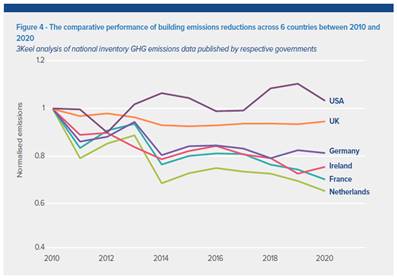Ireland reduces building emissions by a quarter in past decade but is still set to miss ambitious net zero targets

Reductions in carbon emissions from buildings are stalling in several G20 countries in Europe (UK, France, and Germany) and emissions are now rising in the USA, warns a major new study from sustainability consultancy 3Keel for Kingspan, the global leader in high-performance insulation and energy-efficient building solutions.
The Global Retrofit Index interim report – a follow on to the inaugural 2022 study – examines historical buildings emission trends and retrofitting rates to identify the gaps between current action and what is required to meet the goals of the Paris Agreement*.
The publication includes a deep dive analysis of building emissions data of some of the highest performing countries in last year’s inaugural study, with the addition of Ireland’s relatively young building stock this year as an interesting EU-based case study.
 Whilst progress has been made amongst EU economies – namely, the Netherlands, France, Ireland, and Germany – the analysis finds emission reductions in these countries are now stalling, whilst the UK’s emissions are also beginning to plateau, and concerningly, in the USA, GHG emissions from buildings are increasing.
Whilst progress has been made amongst EU economies – namely, the Netherlands, France, Ireland, and Germany – the analysis finds emission reductions in these countries are now stalling, whilst the UK’s emissions are also beginning to plateau, and concerningly, in the USA, GHG emissions from buildings are increasing.
Analysis by 3Keel has revealed the reductions in building emissions over the past decade, and the additional cuts in building emissions required to align with the national net zero scenario of each country [see Table 1 below]
If each of the six countries continue with their current GHG emissions reduction trajectory and retrofitting rates over the past ten years, by 2040 these major global economies will be some distance from achieving their respective net zero pathways.
| Country | Reduction in building emissions between 2010 – 2020 (%) | Additional reduction in building emissions required between 2020- 2040 to align with national net zero scenario (%) |
| USA | +3% | -73% |
| UK | -6% | -71% |
| Germany | -19% | -81% |
| Ireland | -25% | -99% |
| France | -31% | -77% |
| Netherlands | -36% | -64% |
Table 1:
Furthermore, detailed analysis of Energy Performance Certificate (EPC) data shows buildings in the UK, France, and Ireland have seen relatively little improvement in the past decade with the vast majority still rated C, D or below. This means they are not energy efficient enough to deliver the decarbonisation required by the Paris Agreement. Meanwhile, Germany’s residential building stock continues to be over-reliant on fossil-fuel heating.
Though retrofitting solutions already exist, the study identifies sizeable barriers preventing rapid and widespread implementation including insufficient private investment, an inadequately sized and skilled workforce, and limited awareness amongst citizens and building owners.
Despite retrofitting remaining a significant challenge, its importance in decarbonising the built environment has never been more evident – 80 per cent of the buildings that will be standing in 2050 have already been built[1].
Recognising the barriers to decarbonisation, the report also identifies five key elements that are central to delivering a successful retrofitting framework:
- Setting net zero building performance standards
- Developing a national retrofit plan
- Providing financial incentives and support
- Upskilling the workforce and scaling the supply chain
- Promoting best practice and data transparency.
Each of these elements is crucial to enabling effective, affordable, and at scale retrofitting of national building stocks. Retrofitting building stocks also offers significant opportunities and benefits beyond meeting climate targets, including job creation, reductions in social inequality, and improved health and quality of living.
Report author Olwen Smith of 3Keel said: “With over a quarter of total global emissions stemming from the operation of our buildings, retrofitting is a pivotal lever for decarbonising the global economy. However, this study shows a concerning stagnation of progress. Our analysis of six countries with old building stocks reveals that reductions in building emissions are now stalling and retrofitting rates are lagging far behind what is required to meet net-zero goals.
“The tools and technologies required to improve energy performance in buildings already exist. Coordinated efforts between governments and the private sector are now needed to overcome implementation barriers and rapidly scale retrofitting to drive down building emissions globally.”
Bianca Wong, Global Head of Sustainability at Kingspan, said: “This analysis again demonstrates the importance of retrofitting as a lever in decarbonising the built environment if we’re to limit global warming to 1.5˚C and meet the objectives set out by the Paris Agreement.”
“With this report, we encourage policymakers and the construction industry to continue to work together to facilitate change, through innovation and regulation, to bring forward workable ideas to support retrofit solutions and reduce global building emissions.”
* The Paris Agreement is a legally binding international treaty on climate change. It was adopted by 196 Parties at the UN Climate Change Conference (COP21) in Paris, France, on 12 December 2015. It entered into force on 4 November 2016. Its overarching goal is to hold “the increase in the global average temperature to well below 2°C above pre-industrial levels” and pursue efforts “to limit the temperature increase to 1.5°C above pre-industrial levels”.







